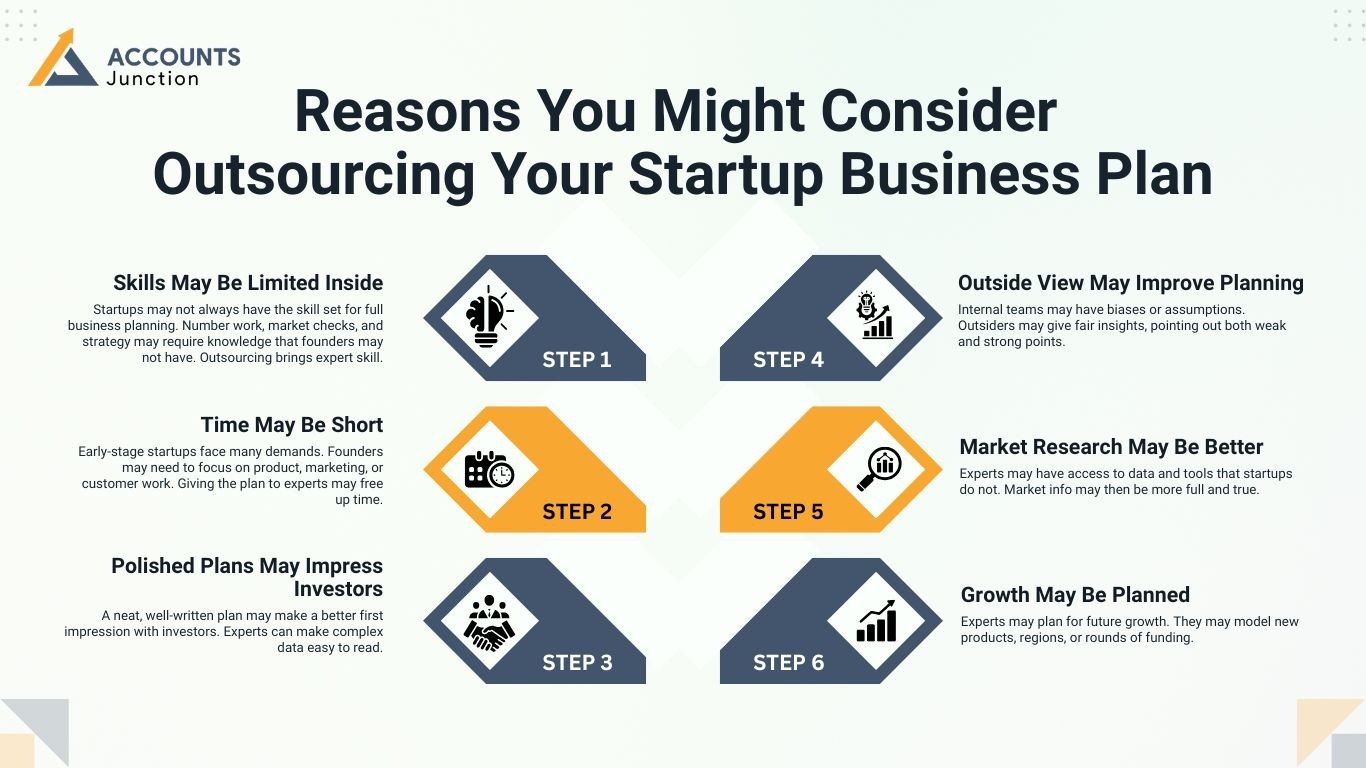
Should You Outsource Your Startup Business Plan? And what are its benefits?
Starting a new business can be both exciting and hard. Every entrepreneur hopes for success, but planning the way forward may not always be simple. One question that may come up is whether you should outsource your startup business plan. There is no single answer, but looking at the benefits and points to consider may help you decide.
In this post, we will explain why startups may think about outsourcing their business plan, what benefits it can bring, and some points to check before making the choice.
Why a Business Plan Matters for a Startup
A startup business plan may act as a guide for your company. It may show your goals, ways to reach them, target market, and projected finances. While some founders may feel able to draft it themselves, others may struggle with structure or numbers.
- Direction and clarity: A business plan may help set a clear path. It may guide decisions step by step.
- Investor confidence: Investors may prefer startups with clear plans. It may make raising funds easier.
- Risk management: A plan can show possible risks and ways to reduce them. Startups often outsource their business plan to get expert insight into potential risks.
- Team alignment: Staff may follow the plan to stay in line with the vision and goals.
Even with these benefits, making a business plan may take much time and work. This is where outsourcing may help.
What Does Outsourcing a Startup Business Plan Mean?
Outsourcing your startup business plan means hiring experts outside your company to make the plan. These specialists may give market research, number projections, and strategy advice. Instead of spending weeks on drafts and research, startups may get a plan that is more complete and clear.
- Professional approach: Outsourced plans may show a skilled view that founders may lack.
- Time savings: Founders can focus on the main business work while experts make the plan.
- Fresh view: Outsiders may find gaps or ideas that the internal team may miss.
While it may not guarantee success, choosing to outsource your startup business plan can give your venture a strong start.
Reasons You Might Consider Outsourcing Your Startup Business Plan
Outsourcing a plan may give benefits that may beat doing it yourself. Here are reasons startups may think about outsourcing:
1. Skills May Be Limited Inside
Startups may not always have the skill set for full business planning. Number work, market checks, and strategy may require knowledge that founders may not have. Outsourcing brings expert skill.
2. Time May Be Short
Early-stage startups face many demands. Founders may need to focus on product, marketing, or customer work. Giving the plan to experts may free up time.
3. Polished Plans May Impress Investors
A neat, well-written plan may make a better first impression with investors. Experts can make complex data easy to read.
4. Outside View May Improve Planning
Internal teams may have biases or assumptions. Outsiders may give fair insights, pointing out both weak and strong points.
5. Market Research May Be Better
Experts may have access to data and tools that startups do not. Market info may then be more full and true.
6. Growth May Be Planned
Experts may plan for future growth. They may model new products, regions, or rounds of funding.
Possible Drawbacks to Consider
Even with benefits, there may be limits when you outsource your startup business plan.
- Cost may be high: Experts may not fit a tight startup budget.
- Communication may be tricky: Misunderstandings can happen without clear talks.
- Less control: Founders may feel distant from the plan if outsiders do most work.
- Quality may differ: Not all providers may meet your needs.
Choosing carefully and clear talks with the expert may reduce these risks.

Key Benefits of Outsourcing Your Startup Business Plan
Outsourcing may give both clear and hidden advantages. Here are benefits startups often note:
1. Save Time
Making a plan from scratch may take weeks or months. Outsourcing may cut this time sharply.
2. Expert Advice
Experts may give tips on industry norms, what investors expect, and market trends.
3. Better Accuracy
Numbers and strategy may be more exact and clear.
4. Focus on Main Work
Founders can work on sales, product, or clients while experts make the plan.
5. Competitive Edge
A clear plan may make a startup stand out to investors and partners.
6. Flexible Options
Outsourced plans may fit different goals, like funding, strategy, or market entry.
How to Choose a Provider
The right provider may affect quality if you outsource your startup business plan. Check these points:
- Experience in your field: Experts who know your market may give better advice.
- Portfolio or samples: Past work may show style and skill.
- Client reviews: Feedback can show strengths and weak points.
- Cost vs value: Cheap may not be best; balance cost and benefit.
- Clear communication: Regular updates may prevent gaps or confusion.
Steps to Make the Most of Outsourcing
Even when you outsource your startup business plan, you can take steps to get full value:
- Set goals clearly: Share your aims, key points, and audience with the expert.
- Give internal data: Share numbers and past work to make the plan true.
- Check drafts often: Feedback may keep the plan close to your view.
- Ask questions: Know why experts suggest ideas or numbers.
- Use the plan wisely: Treat it as a guide, not the final word.
Common Cases Where You Might Outsource Your Startup Business Plan
1. Limited Time or Resources
Outsourcing helps founders who have little time or money. It lets them focus on key tasks without delays.
2. Lack of Internal Skills
It works when the team lacks the needed skills. Outsourcing brings skills that the team may not have.
3. Investor Expectations
Investors want a clear and strong business plan. A good plan can win investor trust and support.
4. Need for Market Research
Outsourcing helps when market research is very important. It gives useful insights for smarter business decisions.
5. Expansion into New Markets
Launching in new areas can be hard and risky. Outsourcing helps understand new markets and their risks.
6. Benefit of a Structured Start
Outsourcing gives a clearer and organized business start. It helps avoid mistakes and sets clear first steps.
Key Checks Before Outsourcing
1. Budget and Costs
Check the budget to see if outsourcing fits well. Think about hidden costs and compare different provider options.
2. Level of Control Desired
Decide how much control you want to keep over work. Set clear rules for progress and key decision-making.
3. Provider Skills and Trustworthiness
Check the provider’s skills, past work, and trust carefully. Look for client feedback and work experience before hiring.
4. Confidentiality and Data Safety
Make sure the provider keeps data safe and private. Ask about agreements and how they protect sensitive information.
5. Compatibility with Daily Work
Check if outsourcing fits your normal work schedule. Good communication helps make collaboration smooth and effective.
6. Assess Suitability
Review these points to see if outsourcing is right. It works best only when it suits your business needs.
Deciding whether to outsource your startup business plan may depend on time, skill, and budget. Doing it in-house may work for some, but outsourcing may save time, give expert views, and deliver a neat result. It may help get funding, guide work, and reduce risk.
Startups may benefit from picking providers wisely, sharing clear information, and checking drafts often. In many cases, outsourcing may be a smart choice, giving a strong start and clear path. Accounts Junction helps startups create clear business plans. Our team may give firms smart advice and strong support. Working with Accounts Junction may make planning easy, clear, and safe.
FAQs
1. What does it mean to outsource your startup business plan?
It means hiring help to make the plan instead of doing it yourself.
This may save time and give tips to guide your work.
2. Why should a startup consider outsourcing its business plan?
It may save time, bring skill, and make the plan clear.
It may also let founders work on main business tasks.
3. How can outsourcing improve investor confidence?
A clear, neat plan may make investors trust your startup.
It can show your startup is real and ready to grow.
4. Is outsourcing suitable for early-stage startups?
Yes, it lets founders work on growth while others make the plan.
This may give the startup a strong start without stress.
5. What costs are involved in outsourcing a business plan?
Cost changes by provider and work, but many fit small budgets.
You can pick the level of work based on what you need.
6. Will an outsourced plan include market research?
Yes, most plans have market facts, rivals, and customer info.
This may help you make smart choices and spot new chances.
7. Can outsourcing help with financial projections?
Yes, experts may make charts for cash, cost, and sales.
They may also show growth to guide startup choices.
8. How do I pick the right provider for outsourcing?
Check their work, past plans, reviews, and how they talk.
Ask for samples to judge skill and style.
9. Will outsourcing save time compared to creating the plan in-house?
Yes, it may take weeks instead of months to finish the plan.
This may free founders to work on product or client needs.
10. Can outsourcing help identify risks in my startup idea?
Yes, experts may spot risks and show ways to avoid them.
They may point out weak spots founders may miss.
11. Do I lose control of the plan if I outsource it?
No, you can give feedback to keep the plan on track.
Regular checks may make sure the plan fits your goals.
12. Can outsourcing support funding applications or loans?
Yes, banks and investors like clear plans that are well made.
A neat plan may raise the chance of getting funds approved.
13. How detailed is an outsourced business plan usually?
Plans cover goals, work, cash, growth, and marketing steps.
Some may also show timelines and step-by-step ways to act.
14. Can outsourcing help with long-term business strategy?
Yes, experts may plan growth, scale, and next steps.
They may show future risks and ways to face them.
15. Is confidentiality a concern when outsourcing a business plan?
Good providers sign deals to keep your info safe.
You can also ask that data be stored in a safe place.
16. Can I customize an outsourced plan for my startup’s needs?
Yes, most plans are built to fit your goals and field.
You can focus on parts that matter most to your work.
17. Does outsourcing guarantee success for my startup?
No, but it may make you ready and clear for investors.
It may help avoid mistakes and plan steps the right way.
18. Can outsourcing help startups without in-house expertise?
Yes, it brings skill in cash, planning, and market checks.
This may make the startup strong and set for growth.
19. How often should I update an outsourced business plan?
Plans can be updated as your startup grows or markets change.
Small updates keep the plan useful and fit the current time.
20. Are outsourced business plans better than in-house plans?
They may be more neat and clear, if your team lacks skill.
A neat plan may also help you stand out to investors.
